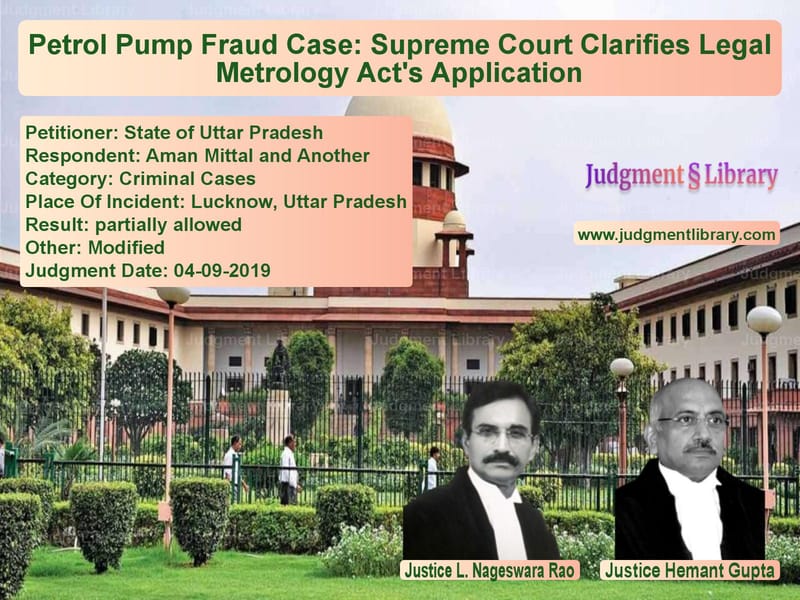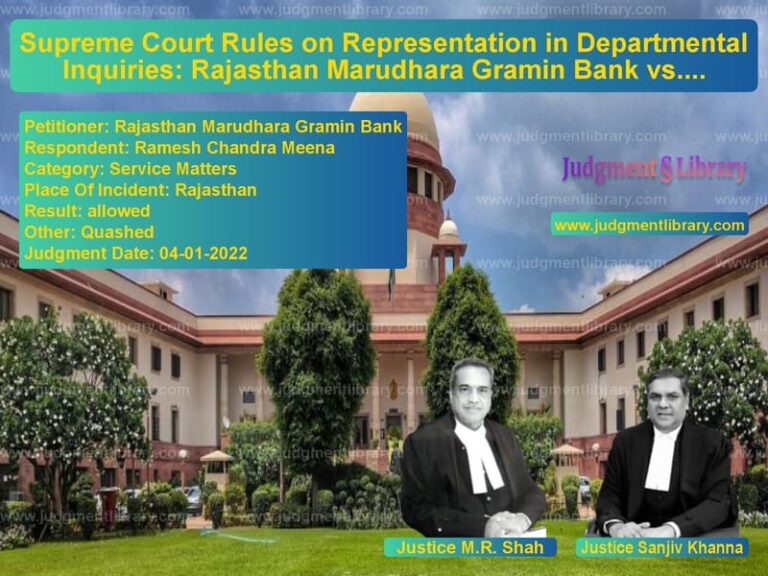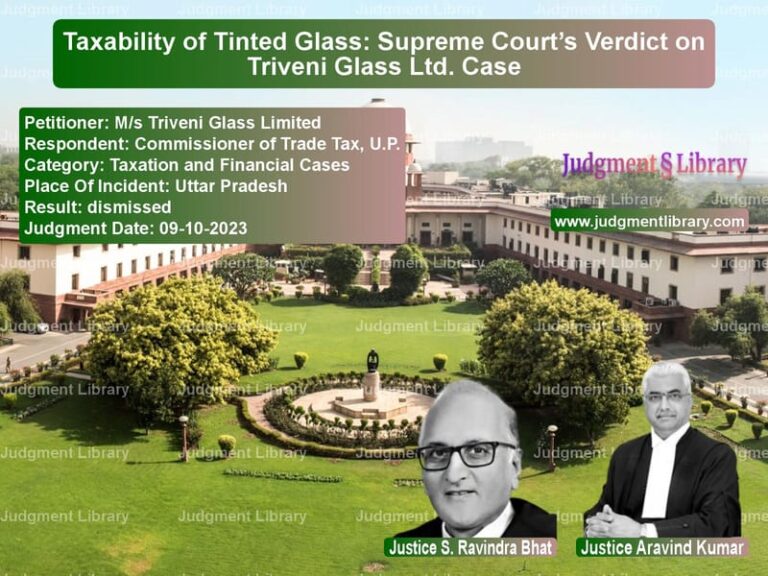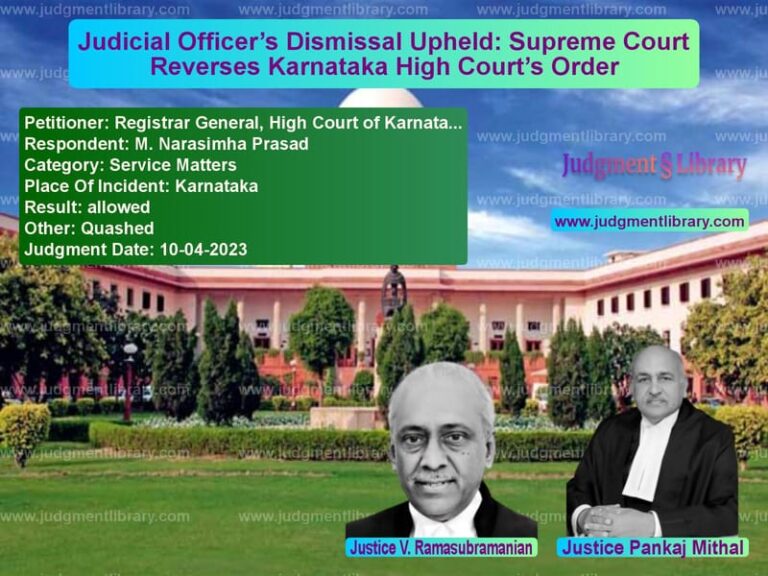Petrol Pump Fraud Case: Supreme Court Clarifies Legal Metrology Act’s Application
The case in question revolves around a significant legal issue concerning the applicability of the Indian Penal Code (IPC) and the Legal Metrology Act, 2009 in matters involving weights and measures. The Supreme Court was tasked with determining whether offenses under IPC could be charged in cases related to fraudulent short delivery of petroleum products at retail fuel stations, or if such matters were solely governed by the Legal Metrology Act.
Background of the Case
The case originated from an investigation conducted by the Special Task Force (STF) of the Uttar Pradesh Police, which uncovered large-scale fraud at petrol pumps in Lucknow. The investigation found that certain fuel stations were engaging in malpractice by delivering less fuel than what customers had paid for. The manipulation was executed through the installation of electronic chips in fuel dispensing machines, which allowed operators to control the fuel flow remotely and shortchange customers.
An FIR was lodged against multiple accused persons under Sections 265, 267, 420, 34, and 120-B of IPC, along with Sections 3 and 7 of the Essential Commodities Act, 1955, and Sections 12/30 of the Legal Metrology Act, 2009. The case was subsequently brought before the High Court, where the accused sought relief by challenging the inclusion of IPC offenses in the charge sheet.
Petitioner’s (State of Uttar Pradesh) Arguments
The State of Uttar Pradesh contended that:
- The accused engaged in fraudulent practices by tampering with fuel dispensing machines to deceive customers, which constituted cheating under Section 420 IPC.
- The installation of electronic chips to manipulate the quantity of fuel dispensed amounted to forgery under Sections 467, 468, and 471 IPC.
- The presence of a conspiracy to defraud customers warranted charges under Section 120-B IPC.
- Since the fraudulent activities were not limited to mere discrepancies in weights and measures, the provisions of IPC should be applicable alongside the Legal Metrology Act.
Respondents’ (Aman Mittal & Others) Arguments
The respondents argued that:
- The Legal Metrology Act is a special statute that exclusively deals with offenses related to weights and measures, and therefore, IPC provisions cannot be applied in such cases.
- Section 51 of the Legal Metrology Act specifically excludes the application of IPC provisions in matters covered by the Act.
- The offenses alleged against them fall within the jurisdiction of the Legal Metrology Department and should not be subject to police investigation under the general provisions of IPC.
- As per the Act, first-time offenses are compoundable, and the prosecution must follow the procedure laid out under the special law rather than invoking IPC provisions.
High Court’s Decision
The High Court of Allahabad ruled in favor of the accused, holding that:
- The Legal Metrology Act is a special statute that overrides the general provisions of IPC in cases related to weights and measures.
- Sections 265 and 267 of IPC, which deal with fraudulent use of false weights or measures, cannot be applied in cases covered by the Legal Metrology Act.
- Since the offenses in question pertained to weights and measures, the police had no authority to investigate or register an FIR under IPC.
- Only offenses under the Legal Metrology Act were maintainable, and any action must be taken in accordance with the provisions of that Act.
Supreme Court’s Observations and Judgment
The Supreme Court reviewed the High Court’s decision and provided clarity on the matter. The Court held:
“The provisions of the Legal Metrology Act, 2009 have overriding effect only to the extent of offenses specifically covered under the Act. However, offenses under IPC such as forgery, criminal conspiracy, and cheating are distinct and can be prosecuted separately.”
The Court further observed:
“Section 51 of the Legal Metrology Act bars the application of IPC only in relation to offenses dealing with weights and measures. However, where there is evidence of criminal conspiracy, forgery, or cheating, the accused can be prosecuted under both statutes.”
As a result, the Supreme Court ruled that:
- IPC provisions related to fraudulent use of weights and measures (Sections 265 and 267) are excluded by the Legal Metrology Act.
- Other IPC offenses, such as forgery (Sections 467, 468, 471), cheating (Section 420), and conspiracy (Section 120-B), can still be prosecuted if the facts support such charges.
- The High Court erred in quashing the entire case under IPC, as the allegations went beyond mere short delivery of fuel and involved fraudulent acts that fell under the ambit of IPC.
- The State Police and the Investigating Agency are permitted to proceed with charges under IPC where applicable.
Key Takeaways from the Judgment
- Clarification on Legal Metrology Act: The ruling establishes that while the Legal Metrology Act governs offenses related to weights and measures, it does not exclude prosecution under IPC for fraud-related offenses.
- Balanced Approach: The judgment strikes a balance between the protection offered by the Legal Metrology Act and the broader powers under IPC to prosecute fraudulent schemes.
- Guidance for Law Enforcement: The decision provides clarity to law enforcement agencies on how to proceed with investigations in cases involving fraudulent manipulation of weights and measures.
Impact of the Judgment
- Stronger Prosecution of Fuel Pump Frauds: The ruling ensures that fraudulent activities at petrol pumps can be prosecuted under both IPC and the Legal Metrology Act.
- Prevention of Abuse: By permitting IPC charges in cases of fraud, the Court has prevented misuse of the Legal Metrology Act to escape harsher penalties under IPC.
- Legal Precedent: This judgment serves as an important precedent for future cases involving the intersection of special laws and general criminal statutes.
Conclusion
The Supreme Court’s ruling in this case provides much-needed clarity on the applicability of IPC in cases related to fraudulent activities involving weights and measures. While the Legal Metrology Act governs technical violations, criminal acts involving deceit, forgery, and conspiracy can still be prosecuted under IPC. This decision reinforces the principle that special laws do not automatically exclude the application of general criminal laws, ensuring that perpetrators of fraud are held accountable under all relevant legal provisions.
Petitioner Name: State of Uttar Pradesh.Respondent Name: Aman Mittal and Another.Judgment By: Justice L. Nageswara Rao, Justice Hemant Gupta.Place Of Incident: Lucknow, Uttar Pradesh.Judgment Date: 04-09-2019.
Don’t miss out on the full details! Download the complete judgment in PDF format below and gain valuable insights instantly!
Download Judgment: State of Uttar Prade vs Aman Mittal and Anot Supreme Court of India Judgment Dated 04-09-2019.pdf
Direct Downlaod Judgment: Direct downlaod this Judgment
See all petitions in Fraud and Forgery
See all petitions in Extortion and Blackmail
See all petitions in Legal Malpractice
See all petitions in Judgment by L. Nageswara Rao
See all petitions in Judgment by Hemant Gupta
See all petitions in partially allowed
See all petitions in Modified
See all petitions in supreme court of India judgments September 2019
See all petitions in 2019 judgments
See all posts in Criminal Cases Category
See all allowed petitions in Criminal Cases Category
See all Dismissed petitions in Criminal Cases Category
See all partially allowed petitions in Criminal Cases Category







